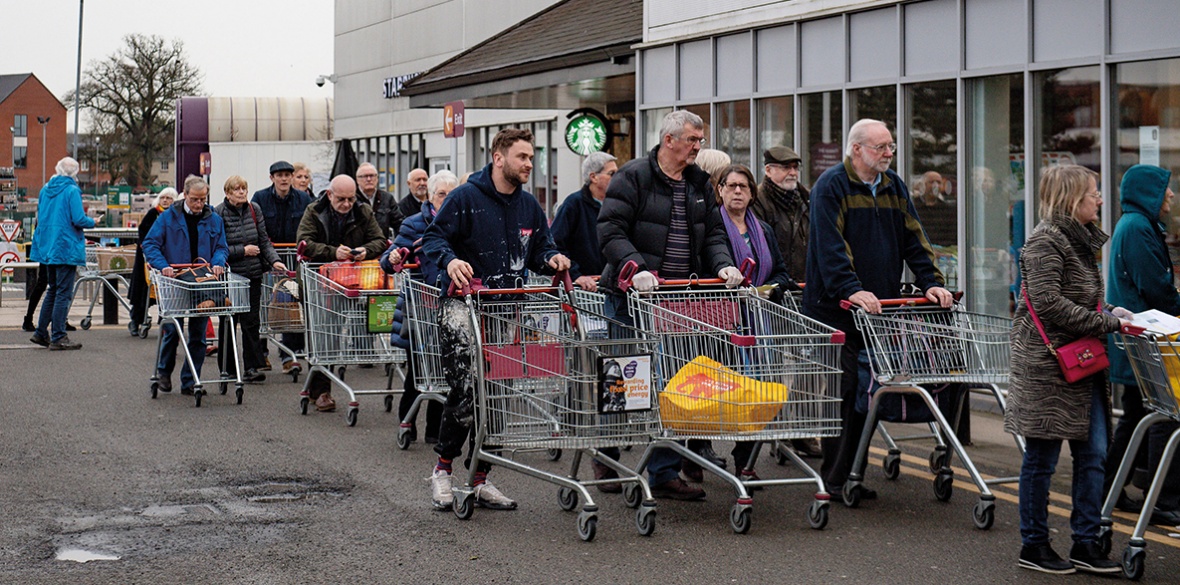This is the last article you can read this month
You can read more article this month
You can read more articles this month
Sorry your limit is up for this month
Reset on:
Please help support the Morning Star by subscribing here
AS WE head into a second lockdown in England and restrictions continue to affect all of the UK nations, it is crucial that low-paid workers do not pay the price of fighting this appalling pandemic.
The second spike in Covid-19 infections, resulting in pressure on the NHS and a deeply distressing increase in deaths means we understand why governments are imposing restrictions, but they must be implemented fairly.
Many low-paid workers, particularly in non-essential retail, face a double whammy of reduced income and greater job insecurity. Low-paid workers cannot afford to pay the price of another national lockdown.
On October 31, when the announcement of the second lockdown was about to be made, it was due to coincide with the financial support for furloughed workers being reduced to the Job Support Scheme’s 67 per cent of their normal earnings.
The trade-union movement made it clear that support should continue at the Job Retention Scheme’s 80 per cent. The government responded and in the broadcast that declared the second lockdown it also announced that the Job Retention Scheme and the 80 per cent government support for wages of furloughed workers would continue.
This is good news, but is it enough? Workers struggling to make ends meet on the National Minimum/Living Wage face the prospect of getting only 80 per cent of the statutory minimum wage for the hours they usually work if they are furloughed. Their wages should be protected and topped up to at least the National Living Wage for the normal hours they work.
According to Office for National Statistics data published this week, Britain’s worst-paid workers were over 20 times more likely to be furloughed on reduced pay than the highest earners. More than half who were usually paid less than £8.72 per hour were furloughed with a pay cut, compared with 2.5 per cent of those earning more than £29.67.
While the Job Retention Scheme is important, with many employers not topping up wages, around two million workers were paid less than the legal minimum wage last April. It cannot be right that our lowest-paid are plunged into poverty when we should all be working together to overcome this crisis.
We have also long called for significant improvements in Statutory Sick Pay, which dramatically cuts workers’ income when they are forced to take time off, and the issue is now more pressing in the midst of the Coronavirus emergency. The Prime Minister once said: “Nobody should be penalised for doing the right thing.” That is easy to say, but means very little if it is not backed up with action.
Low-paid workers should be helped to go into necessary self-isolation by ensuring there is no loss of income. This has to be a crucial part of tackling Covid-19. Even the health secretary had to admit he couldn’t live on Britain’s statutory sick pay, but who could survive on £95.85 a week? Workers should receive their average earnings to help limit the spread of the virus.
While we understand the need for another lockdown, the government cannot ignore the devastating impact this will have on our high streets in the run-up to Christmas. Retail was already struggling before the pandemic and the industry has suffered over 125,000 retail job losses and 14,000 store closures this year.
Throughout the Covid crisis Usdaw engaged with the government. However the government is no longer listening. We have a choice. Do we want to see our high streets go to the wall, or do we want to save them? Retail is an important feature of our towns and cities: it employs three million people across Britain. What retail needs is a tripartite approach of unions, employers and government working together to develop a plan to help the industry through a second lockdown.
Next Monday the Living Wage Foundation will announce this year’s uprating of the real living wage. The revised rates for the National Living Wage and National Minimum Wage are expected to be announced by the Low Pay Commission anytime soon. If there was ever a year that low-paid workers deserve a pay rise it’s 2020. Claps on a Thursday do not pay the rent or put food on the table.
While we have understood the extraordinary measures that have to be taken, we are concerned by the overall response. Too often the government has chased the pandemic rather than get ahead of it. Early closure of furlough and the last-minute extension caused a great deal of uncertainty for business and we have no doubt that redundancy decisions were made because of this chaos.
There needs to be a better-planned approach, an openness to work collectively and an understanding that we are all in this together, so nobody should be left behind.









